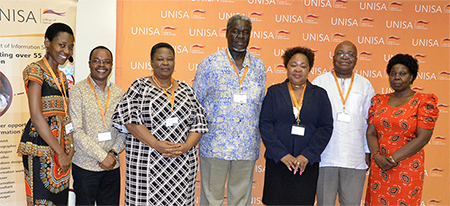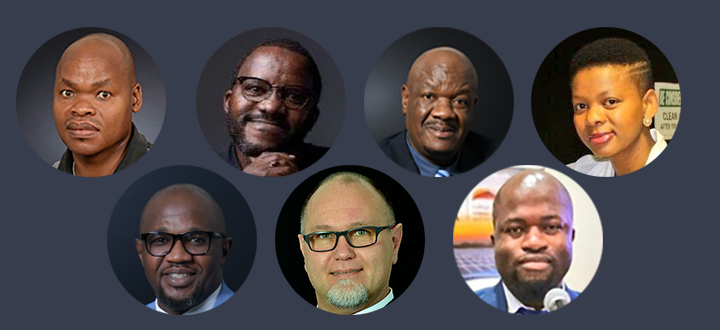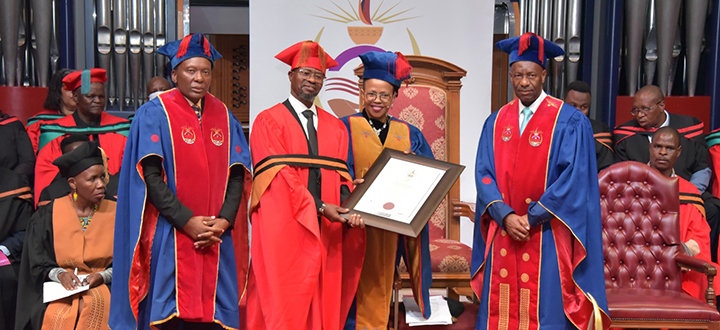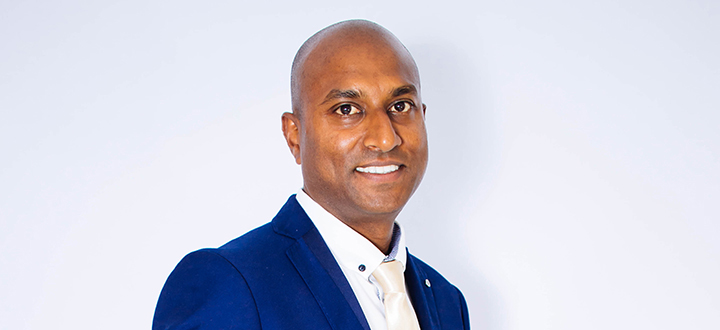College of Human Sciences
Information Science Research Indaba

Pictured are Prof Segalo Puleng (Head for Research and Graduate Studies: College of Human Sciences); Prof Bosire Onyancha (Department of Information Science); Prof Luyanda Dube (CoD: Information Science); Prof Denis Ocholla (University of Zululand); Pateka Ntshunsthe-Matshaya (Walter Sisulu University); Prof Patrick Ngulube (College of Graduate Studies); Prof Mabel Majanja (Department of Information Science)
The Department of Information Science in the College of Human Sciences hosted a Research Indaba, which interrogated and explored the different research elements. Professor Luyanda Dube, the department’s head, set the scene for the day by highlighting that through research, knowledge is distributed and shared and we need to use our African knowledge, we need to become knowledge producers.
“We need to engage in critical conversations that will enable our profession, the library of information science to develop and transcend development and limitations, we have to listen to our students, and we have to listen to the market.”
Head for Research and Graduate Studies in the College, Professor Puleng Segalo, said universities have to remain relevant and in tune with the world. The impact of ICT in the university space has created a platform that provides easy access for students, no matter where they are from. She added that disciplines have to constantly reflect on their offerings and as we move towards a decolonised university. “It is critical for us to engage and look for ways in which our disciplines hinder or enable the possibility for multiple forms of knowing.”
Professor Patrick Ngulube spoke on transcendence in Information Science research methodology, explaining that theories help to explain happenings to the world, “there is no science without theory”. He questioned whether we are universalising existing theories and elevating them into grand theories. He said that for us to develop African context we need to look at relevance and we need to shift and decolonise. Name-dropping has become relevant as false contribution, he added.
Professor Mabel Majanja said that we must continuously shift and adjust our practice to meaningfully respond to the new frontiers of information knowledge as a way to breaking boundaries. “Convenience is important both for the user of the technology and the creator.”
Defining ethics as a branch of philosophy that studies human behavior in terms of what is good or bad regarding relationships with themselves, others and the environment was Professor Denis Ocholla. He spoke about ethical considerations in Information Science research and said it is important for there to be an ethics code of conduct in research, to enable students to be on the right path.
Pateka Ntshunsthe-Matshaya closed off the event by speaking on the necessity of publishing by practitioners and stated that publish or perish is one of the powerful phrases coined to put pressure on academics to produce and generate rapidly, and continuously generate new knowledge.
*By Nomshado Lubisi (CHS communications and marketing)
Publish date: 2018-05-02 00:00:00.0

 Young Unisa doctoral graduate joins elite Lindau Nobel Laureate group
Young Unisa doctoral graduate joins elite Lindau Nobel Laureate group
 Education MEC addresses Unisa autism seminar
Education MEC addresses Unisa autism seminar
 Seven Unisans nominated for the NSTF-South32 Awards 2023/2024
Seven Unisans nominated for the NSTF-South32 Awards 2023/2024
 Unisa awards posthumous honorary doctorate to literary maven, OK Matsepe
Unisa awards posthumous honorary doctorate to literary maven, OK Matsepe
 From humble beginnings to academic leadership
From humble beginnings to academic leadership